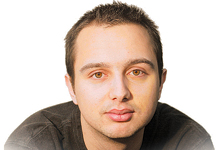 Kris Kotarski is a journalist and peace and conflict researcher. He grew up in Warsaw, Poland before immigrating to Canada in 1991. In the last year, he has been based somewhere between Calgary, Ottawa, Warsaw, and Berlin He contributes regular columns to the Calgary Herald and 3 Quarks Daily.
Kris Kotarski is a journalist and peace and conflict researcher. He grew up in Warsaw, Poland before immigrating to Canada in 1991. In the last year, he has been based somewhere between Calgary, Ottawa, Warsaw, and Berlin He contributes regular columns to the Calgary Herald and 3 Quarks Daily.
Is there an advocacy movement for Darfur in Poland?
There is a nascent Darfur advocacy movement, but, like many Polish civil society initiatives that look outward, it is very modest when compared to movements in more established western democracies. Poland’s civil society is still in the process of expanding and consolidating the freedoms won after 1989, and a number of domestic social issues (including corruption in the public sector and access to healthcare) take up the majority of the activist community’s attention. In foreign matters, Poles still tend to see the world through the lens of the country’s negative brushes with great power politics, so Chechnya and Tibet are more natural causes because of enmity toward Russia and all remaining communist regimes. Darfur in particular, and African issues in general, seem quite far away, although it is interesting to note that Poles often see Western inaction (at the great power level) as willful complicity in the situation.
The main portals for Poles interested in Darfur are Polska dla Darfuru (Poland for Darfur) http://www.darfur.pl/index.php, which is periodically updated by activist Magdalena Nagórska and Darfur bez Znieczulenia (literally: Darfur without anesthetic) http://darfur.blox.pl/html, updated by two anonymous activists. While the latter serves a collection of news updates for concerned Poles, Polska dla Darfuru has organized a number of seminars and film screenings across the country over the past three years.
In 2004, the largest Polish aid NGO, Polska Akcja Humanitarna (Polish Humanitarian Organization) , took its first steps in Darfur by donating supplies to the Zam Zam IDP camp in North Darfur. In 2007, it partnered with the Sudan Social Development Organization (SUDO), a Sudanese human rights and development NGO, to develop water projects throughout the region. Polska Akcja Humanitarna is both a major aid delivery NGO and an advocacy body, so that partnership resulted in increased involvement by staff in public awareness campaigns through participation in seminars, etc. It also resulted in greater media coverage, especially by Gazeta Wyborcza , the Polish daily of record, which ran a special report and call to action on Darfur in 2007. Sadly, SUDO was banned by the Bashir regime and forced to dissolve in early March 2009, and PAH has yet to find a new partner in Darfur.
The final wrinkle is the participation of a contingent of 500+ Polish troops and three helicopters in the EUFOR stabilization mission in Chad, a mission that enjoyed broad public support because Poles generally view foreign assignments as good training and integration opportunities for the army. Poland, which has also committed 150 personnel to the United Nations Mission in the Central African Republic and Chad (MINURCAT), was one of the larger troop contributing states to the EUFOR mission and Polish troops participated in the protection of Darfuri refugees. However, due the global financial crisis, the Polish government decided to scale back its foreign troop commitments, and decided to withdraw its troops Chad (as well as longstanding peacekeeping commitments in the Golan Heights) in order to create savings for the national budget. This decision was not opposed by opposition political parties or by the press, and, at the moment, Polish forces are due to leave Chad in the fall of 2009.
What have you heard about the US-based Darfur advocacy movement?
In practical terms, I am less of a Polish activist and more of a Canadian journalist (and until recently strategic studies student), so in contrast to anyone in Poland, I have had the opportunity to follow the work of the American advocacy network very closely. Despite the fact that the movement has not yet reached its primary goals of halting the continuing atrocities in Darfur, I am very impressed with the depth of the movement and the creativity of individual activists. From divestment campaigns to attempts at helping the African Union buy equipment, there is no shortage of ideas, although the movement has not always been able to achieve concrete results when pressuring the U.S. government (or other actors) to take desired action.
What types of people do you think are involved in it?
It seems to be very diverse. It includes teachers, students, churches, people of all ages… and, of course, Mia Farrow.
What do you think they are trying to accomplish?
The main goal is halting the genocide in Darfur.
To that end, some seem to be involved in a broad awareness campaign, which has raised Darfur to a more prominent place in the American and (because of the reach of U.S. media) global public discourse.
Others seem concerned with applying leverage where they can, so primarily on the U.S. government to speak out (or act) in their name in the international arena, and on China through negative publicity and divestment campaigns.
[Note from Bec – This will be available in Polish later this week. Sorry for the delay]









Speak Your Mind